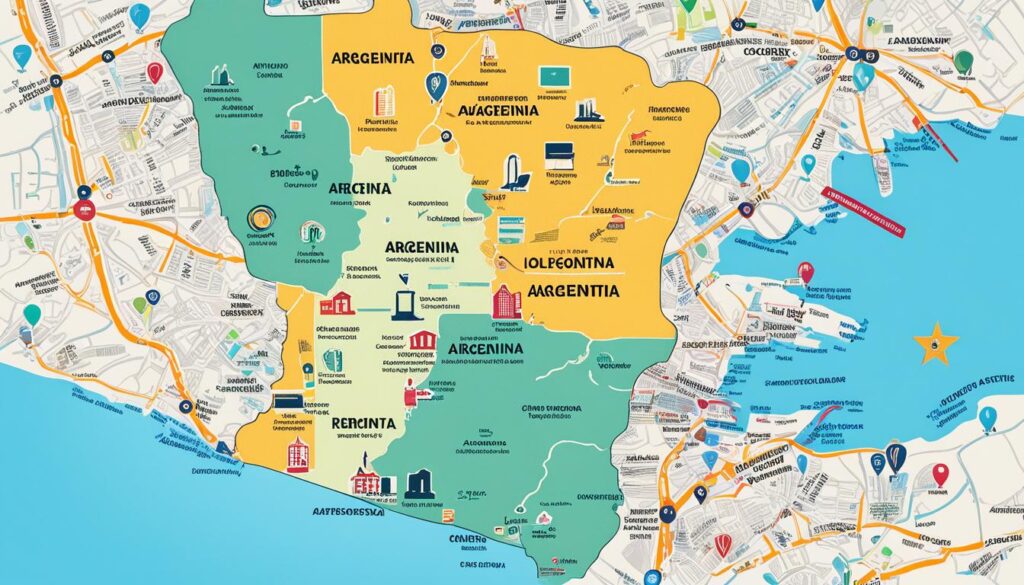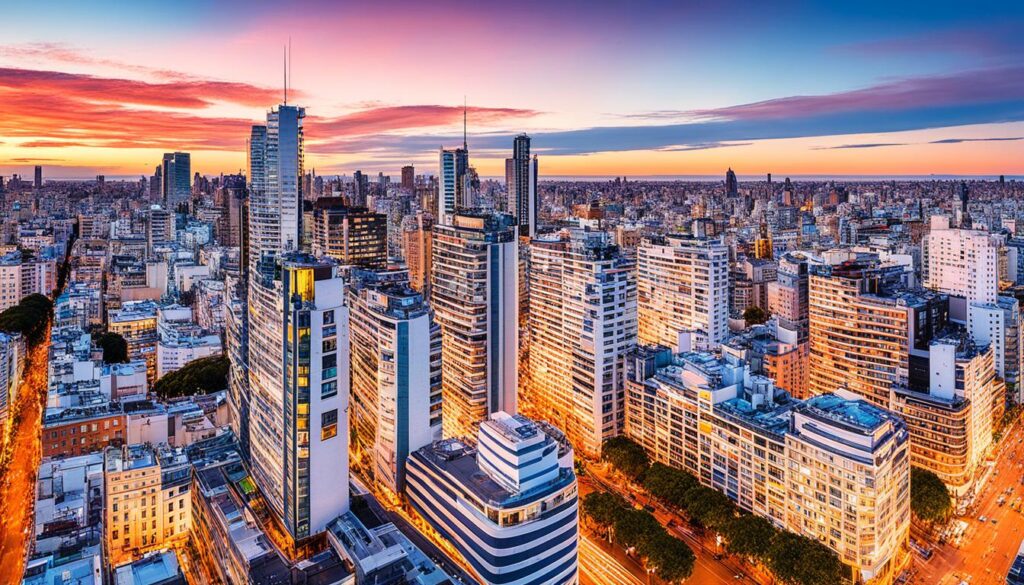Argentina has emerged as a vibrant destination for those seeking new opportunities and a rich cultural backdrop. Understanding the process of obtaining your Argentina Residence Permit is essential for anyone looking to relocate to this diverse nation. The country’s immigration policy is designed to cater to a wide range of demographics, from professionals to retirees. Various visa categories, including temporary residency permits and permanent residency options, provide appealing pathways for long-term residency.
Newcomers can benefit significantly, with access to quality education and healthcare systems ranked among the best in Latin America, as well as enticing economic opportunities that must be considered. For more information on how to efficiently navigate the Argentina visa requirements and understand how to apply for your Argentina Residence Permit, visit this comprehensive guide. With a population of approximately 46 million, Argentina has a large expat community, including over sixty thousand US expats, primarily residing in or around Buenos Aires1. Additionally, obtaining an Argentine passport allows visa-free access to 163 countries, enhancing its appeal as a relocation destination2.
Key Takeaways
- Argentina has a diverse immigration landscape, catering to various needs.
- Multiple residency pathways exist, making it accessible for different demographics.
- Access to top-tier healthcare and education is one of Argentina’s significant advantages.
- Understanding the necessary Argentina visa requirements is crucial for a smooth application process.
- Long-term residency can lead to citizenship and economic opportunities.
Understanding Argentina’s Immigration Policy
Argentina’s immigration policy reflects a rich history and an evolving approach to welcoming foreigners. The nation has long been a destination for immigrants, shaped by diverse cultural influences and changing economic conditions. Analyzing the immigration history in Argentina reveals key trends that contribute to the current landscape for newcomers.
The History of Immigration in Argentina
Between 1857 and 1913, the country saw an influx of 2,711,648 immigrants, with peak arrival years occurring between 1901 and 1910 when 1,120,222 people moved to Argentina3. By 1914, 29.9% of the Argentine population was foreign-born, predominantly from Spain and Italy. Over time, the sources of immigration shifted significantly; as of 1980, just 17.8% of immigrants came from these two European countries, while Latin American nationals grew increasingly prevalent3. In fact, 817,144 foreign-born individuals were from Latin America, primarily Paraguay, Bolivia, Brazil, Chile, and Peru, according to the 1991 census3. The Argentina immigration policy has adapted to these demographic changes, reflecting a commitment to integration and support for migrants.
Current Trends and Opportunities for Immigrants
Today, Argentina continues to uphold its tradition of being a haven for those seeking better economic prospects and improved quality of life. Recent legal frameworks, including Federal Law 25,871 established in 2004, prioritize migrant rights and recognize them as subjects of human rights4. This law led to a significant documentation initiative starting in 2006, facilitating access to residency and citizenship for immigrants4. Ultimately, the current opportunities for immigrants in Argentina are robust, underscored by governmental programs that encourage foreign investment and skill acquisition to enhance the country’s economy and cultural richness.
Types of Argentina Residence Permits

Argentina offers a range of residence permits, catering to diverse needs and circumstances. Understanding these options empowers individuals to choose the best pathway for their situation. The main types include temporary residency permits, permanent residency options, and naturalization pathways.
Temporary Residency Permits
Temporary residency permits are quite popular among newcomers, allowing individuals to stay in Argentina for varied purposes such as work, family reunification, or study. These permits can last for up to three years. To qualify for a temporary resident visa, applicants need to demonstrate an annual income of at least ARS 30,000 or around USD 275, ensuring they can sustain their living in Argentina. This income requirement is crucial for retirees as well, offering a renewable opportunity after the initial period.
Permanent Residency Options
Transitioning from temporary to permanent residency status is an attractive option once the established criteria are met. Applicants can gain Argentina permanent residency after residing legally for the defined duration and fulfilling specific financial obligations. Permanent residency grants individuals indefinite stay and access to various benefits.
Naturalization Pathways
The naturalization process in Argentina presents a streamlined route for individuals seeking citizenship. After maintaining legal residency for just two years, applicants can pursue citizenship, which highlights the country’s welcoming nature towards immigrants. Potential naturalization candidates have options like investing ARS 1.5 million in a local business or marrying an Argentine citizen as a pathway towards citizenship. This system reflects an inclusive approach that supports various lifestyles and financial capacities.
To gain a comprehensive understanding of the various Argentina visa types, individuals can investigate their specific circumstances and plan accordingly. Doing so opens up pathways to not only reside but thrive within the Argentine community56.
How to Apply for Argentina Residence Permit

Applying for an Argentina Residence Permit involves a structured approach to ensure compliance with immigration regulations and enhance your chances for approval. A clear understanding of the Argentina visa application process along with having the required documentation for Argentina residence is crucial.
Steps to Gather Required Documentation
Begin by collecting necessary documents. You will typically need your valid passport, proof of address, and certificates validating your legal background. For specific permits, you may need to demonstrate a monthly income equivalent to five Minimum Living and Mobile Wages, which is about USD 1327 as of May 20247. Familiarize yourself with the required documentation from immigration websites to ensure nothing is missed.
Submitting the Visa Application
Once your documents are ready, you can submit your visa application at an Argentinian embassy or consulate, or through relevant governmental channels. Be prepared to provide proof of financial stability and other supporting materials as part of your application to follow the correct guidelines. Ensure that your application includes all necessary papers, including any certificates and records needed for processing.
Approval Process and Timeline
The approval process may take several months, influenced by the type of permit requested and the immigration office’s current workload. Understanding the factors that play into this timeline can help you plan your stay effectively. Therein lies the importance of remaining up-to-date with regulations as they can change rapidly8. Applying early and ensuring all documents are in order can prevent unnecessary delays.
Benefits of Obtaining an Argentina Residence Permit

Securing an Argentina Residence Permit not only simplifies the process of living in a vibrant country but also unlocks numerous advantages. Among these are access to a quality Argentina healthcare system, opportunities for academic growth through education in Argentina, and a pathway to citizenship.
Access to Quality Healthcare and Education
Argentina is celebrated for its healthcare system, renowned for its exceptional services and affordable costs. Approximately 34% of residents choose private health insurance to enhance their healthcare experience, opting for more personalized care options9. Residents, including expatriates, gain the benefit of diverse educational institutions, with many offering international curriculums that cater to a global audience. Access to quality education in Argentina allows families to build a solid future for their children.
Pathway to Citizenship
Individuals who obtain a residence permit have a significant stepping stone towards Argentine citizenship. This status opens doors that facilitate a more permanent life in Argentina, along with the rights and privileges afforded to citizens. Moreover, same-sex marriages have been legally recognized since 2010, providing foreigners with a simplified route to citizenship through marriage, enhancing the inclusivity of the process by considering diverse family structures.
Economic and Business Opportunities
Obtaining a residence permit not only provides an enriching lifestyle but also exposes residents to various economic opportunities in Argentina. With a diverse economy, sectors from technology to agriculture present excellent avenues for investment and growth. Currently, the financial requirement for residency aligns with a monthly income of approximately $1327 USD per applicant, ensuring that individuals are equipped for financial stability10. Engaging with the local economy allows expatriates to thrive and integrate seamlessly into the community.
In summary, the benefits of Argentina residence permit encompass access to a high-quality healthcare system, enriching education, a structured pathway to citizenship, and burgeoning business ventures910.
Conclusion
Acquiring an Argentina Residence Permit can open the door to numerous opportunities in a vibrant and culturally rich environment. Understanding the immigration process in Argentina, along with the various residence options and application procedures, empowers potential immigrants to transition smoothly and confidently into their new lives. With the benefits of residency in Argentina ranging from access to quality healthcare to diverse business prospects, the allure of living in South America is compelling.
As many seek new adventures, Argentina stands out as a welcoming destination for work, study, or retirement. The potential for growth and stability, albeit amid economic challenges, makes it an attractive choice for individuals ready to embrace change while enjoying the comforts of excellent education and healthcare systems. Whether you’re considering the Rentista visa or an investor option, it’s essential to prepare adequately for the application process and understand the requirements involved.
Ultimately, the journey toward securing an Argentina Residence Permit not only facilitates a personal and professional transformation but also invites you to become part of a diverse and thriving community. As you embark on this new chapter, the benefits of residency in Argentina echo a promise of adventure, connection, and flourishing opportunities11.
FAQ
What are the Argentina visa requirements for obtaining a residence permit?
How long does the approval process take for an Argentina Residence Permit?
Can I work while holding a temporary residency permit in Argentina?
What are the different types of Argentina residence permits available?
How can I apply for permanent residency in Argentina?
What is the pathway for naturalization in Argentina?
What are the benefits of obtaining an Argentina Residence Permit?
Are there any specific Argentina immigration updates I should be aware of?
Source Links
- https://nomadcapitalist.com/global-citizen/second-passport/how-to-get-argentina-citizenship-and-residency/
- https://visaguide.world/moving-to/argentina/
- https://mckinneylaw.iu.edu/practice/law-reviews/iiclr/pdf/vol9p395.pdf
- https://blogs.law.ox.ac.uk/research-subject-groups/centre-criminology/centreborder-criminologies/blog/2021/07/argentine
- https://www.rippling.com/blog/work-permits-in-argentina
- https://lawyersargentina.com/permanent-residency-argentina/
- https://immi.legal/rentista-visa/
- https://immiguides.com/immigration-guides/argentina/
- https://goldenharbors.com/articles/argentina-rentista-visa
- https://immi.legal/service/temporary-residence-as-rentista/
- https://expatmoney.com/blog/residency-in-argentina-for-expats

Comments